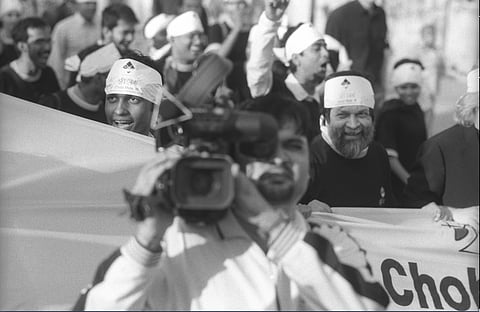In 1993, Shahidul Alam, a Bangladeshi photographer, wrote a letter to the managing director of the World Press Photo awards, asking her to consider changing the name of this renowned photographic association to Western Press Photography. It seemed evident to Alam that, although the photos he had seen were extraordinary, the World Press jury members and most of the photographers chosen as their awardees did not represent the majority of the world – Asians, Africans and Latin Americans. In an interview on Iranian television, Alam explained that when he visited the touring exhibition he was galled to see how casually a Western model, awarding Western photojournalists, was projecting a universal umbrella. The director decided to call Alam, making an equally audacious suggestion: would he bring the exhibition to Dhaka in a month? Three weeks later, the World Press Photo exhibition came to Bangladesh for the first time, displayed in Alam's own Drik gallery. The paint on the walls was still wet when the first viewers were let in. Alam went on to become the first Southasian to chair the international jury of World Press.
Few are capable of such spontaneous moments of belief, of balancing their ideological positions with practical decision-making, and even fewer can make resources and manpower materialise through their deep roots in both regional and international networks. Alam has become a household name in the photography community because of a unique combination of intimacy, tenacity and vision, and his relentless drive to turn small singular successes into structural change. Alam's desire for Southasia and the global South to be reflected in the rosters of the international media and the art world is slowly being realised. Lars Boering, the current managing director of World Press, has seen, firsthand, Alam's persistent rhetoric at international forums against the silencing of the local witness in the global media. As he said in a phone interview from Amsterdam, "His [Alam's] phrase 'majority world' was an eye opener for everybody because there is no argument against it. This argument has stood for twenty years."

